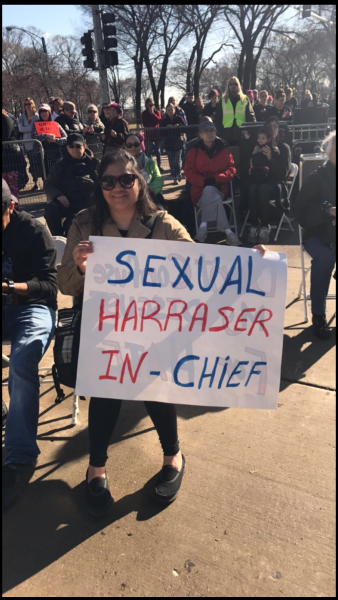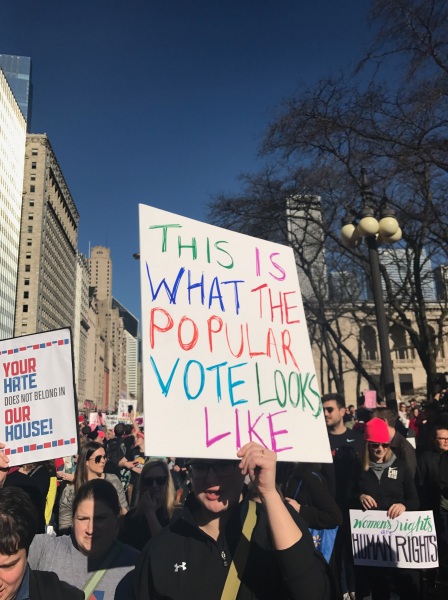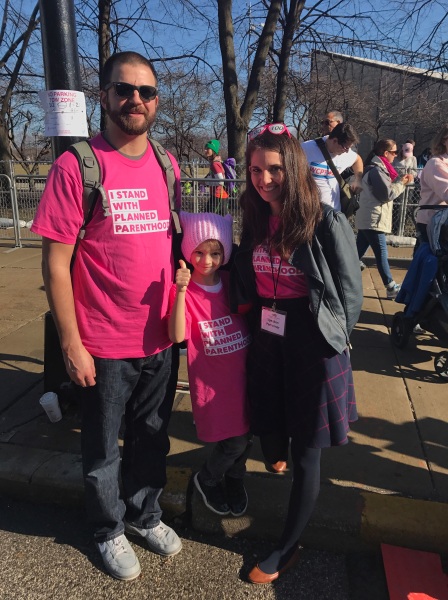Over 250,000 women and allies gathered in downtown Chicago carrying vibrant signs for the Women’s March on Jan. 21.
women and allies gathered in downtown Chicago carrying vibrant signs for the Women’s March on Jan. 21.
Event Emcee Fawzia Mirza said the march was cancelled due to the unexpectedly large turnout that created a safety issue, and was instead a standing rally.
But people were still marching. Supporters formed small groups and marched independently through the packed streets, where other supporters were participating in the standing rally.
“If a woman’s right is affected or at stake, it’s important for everyone to show up,” Mirza said. “That’s why we’ve been hearing from the organizers that allies are welcome. Allies are needed. Allies are important.”
 Hundreds of these allies filled the provided seats to watch an array of speakers and performers present onstage.
Hundreds of these allies filled the provided seats to watch an array of speakers and performers present onstage.
These speakers included Broadway performers Ari Afsar and Karen Olivo from the cast of “Hamilton”.
One of the performers, Vernon Mina from So Chi Voices, said his group was there to represent issues that minorities and women face.
Mina said he was told to expect around 3,000 people, and was shocked when he heard there were hundreds of thousands in attendance.
“You see little girls and little boys with signs that say ‘stand up for my mom,’ or ‘women’s rights,’” Mina said. “It tells you that despite what’s happening in the government right now, there’s so many people here ready to fight for all these rights.”
Volunteer Bet hany Williams said the event, held the day after the inauguration of President Donald Trump, was meant to create a sense of unity and support amongst women and minorities whose rights are being threatened.
hany Williams said the event, held the day after the inauguration of President Donald Trump, was meant to create a sense of unity and support amongst women and minorities whose rights are being threatened.
President Trump recently proposed plans to build a border wall with intentions of keeping immigrants out, as well as targeting women’s healthcare.
Two days after the marches, President Trump reinstated the “global gag rule,” banning U.S. funding to international healthcare organizations that provide abortion information or services.
Men, women and children were carrying signs with positive messages on them, but not all of the signs were as optimistic.
Some signs included more negative messages, such as one sign that said “sexual harasser in-chief” and “not my president.”
Despite some of the pessimism displayed on the signs, Mirza said she considered the march a success.
The Women’s March on Chicago was one of hundreds of women’s marches that were held worldwide. The total attendance was in the millions, making it one of the largest marches in history.
“Women’s rights are human rights,” Williams said.
The phrase was chanted loudly by the thousands of women and allies, reinforcing the inclusive message of the march.









 McKayla Atkinson (front row, far left) and Lauren Sanderson (front row, second from left) participated in Fort Wayne’s Free the Nipple Rally on September 12. Photo by Liz Turkette.
McKayla Atkinson (front row, far left) and Lauren Sanderson (front row, second from left) participated in Fort Wayne’s Free the Nipple Rally on September 12. Photo by Liz Turkette.